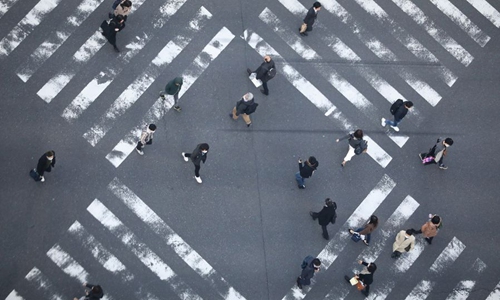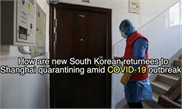SOURCE / MARKETS
Coronavirus in SK, Japan accelerates panel orders shift to China
Rising toll of virus in SK, Japan speeds shift of panel orders

Pedestrians wearing masks walk in the street at Ginza in Tokyo, Japan, on March 6, 2020. (Xinhua/Du Xiaoyi)
Rising cases of COVID-19 in South Korea and Japan, significant manufacturing bases of the panel industry, are likely to accelerate the shift of global panel orders to China with the rise of leading companies such as BOE and TCL, which have maintained stable supplies despite the virus assault, industry insiders said.
Analysts noted that despite South Korea and Japan having an important position in upstream materials production, which may cause delays in shipments, China's localized efforts will help it maintain a stable supply chain.
Unfazed by the virus attack, leading Chinese display makers have reported a stable supply and fast resumption rate. BOE, a supplier of Apple, told the Global Times on Monday that all of the company's assembly Iines have achieved 100 percent resumption rate, while 95 percent of its personnel have returned to their work posts.
The company has production facilities scattered in 11 Chinese cities. BOE's new Wuhan plant, which started operations in December 2019, saw 50 percent of its employees come back to work, according to a report by 21jingji.com on Friday.
Panel shipment by Shenzhen China Star Optoelectronics Technology Co (CSOT), a China-based panel manufacturer owned by TCL, has restarted normal operation, TCL told the Global Times on Monday, noting that the epidemic in South Korea and Japan will have no "material impact" on the supply chain of CSOT.
Production in CSOT's Wuhan factory maintained operation during the virus outbreak. According to the company, low-temperature polysilicon display devices in its Wuhan factory account for 20 percent of the global supplies.
Analysts also shook off concerns that a virus outbreak, which have affected business operations of companies like Samsung and LG Display, might cause a supply chain disruption in China.
Japan and South Korea are the production centers of upstream materials, but upstream materials and equipment are less labor-intensive. Moreover, despite leading companies in the two countries gradually adopting a strategy of working at the office in batches or working from home, there's no shutdowns or reduced production capacities at factories, Lisa Li, president of Sigmaintell Consulting Co, also a veteran watcher of the panel industry, told the Global Times on Monday.
Li noted that the possibility of a disruption of the panel supply chain due to the virus is low, as the domestic industry chain could be "guaranteed" because the localization rate of the panel industry in China has been increasing.
"Most of the direct raw materials for the panel have achieved localized production, such as glass substrates, polarizers, and liquid crystals," Li said.
Over the next year, orders from global consumer electronics brands such as Apple and Huawei, will continue to shift to China, said Li, expecting China's panel industry will account for 57.1 percent of the world's total in 2020, South Korea will fall to 15.3 percent, and Japan will account for 5.4 percent. In 2019, BOE overtook Samsung Display for the first time to become the world's largest smartphone panel vendor.
Last year, BOE shipped 413 million smartphone panels across the world, accounting for 22.2 percent of the global market, followed by Samsung Display with a share of 21.2 percent, the report showed.
But analysts cautioned as a highly globalized industry, risks still exist if the virus epidemic worsens. Lower customs clearance efficiency will delay the transport of upstream materials and delay the shipment of panels, Li explained.



